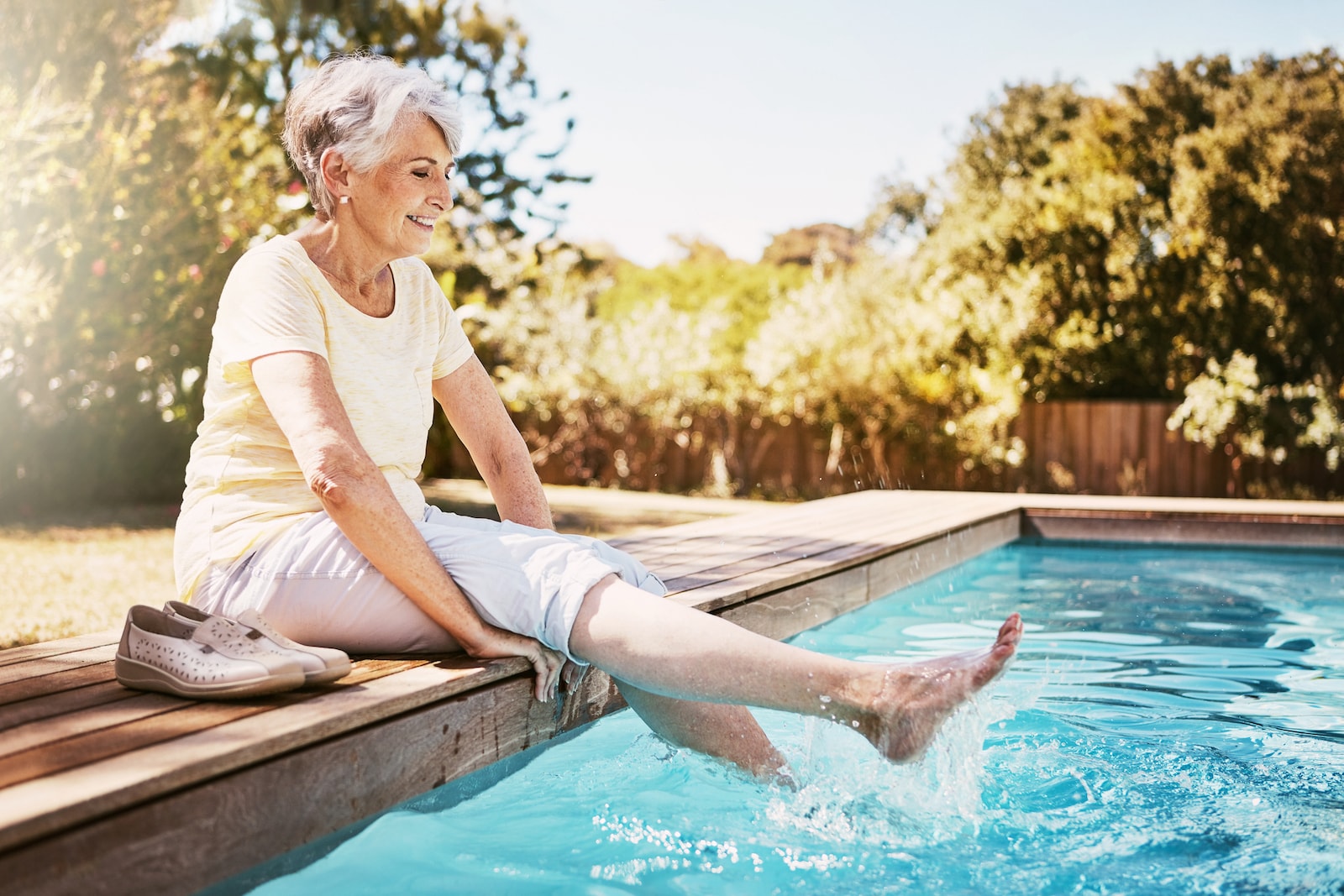The summer months are a time of fun, adventure and relaxation for many, but they can also be a source of stress for older adults and their caregivers. As we age, our physiology changes in ways that boost sensitivity to summer’s heat, humidity and sun exposure. In fact, according to research conducted at Duke University, more than 80% of heat-related deaths occur in people over 60. In addition to physiological factors like reduced sensitivity to thirst, poorer circulation and higher incidence of chronic conditions, seniors are especially vulnerable to heat-related illnesses due to social isolation.
Dr. Elaine Healy, medical director and vice president of medical affairs at United Hebrew of New Rochelle, New York, confirms, “Hot weather can make anyone cranky, but it can be especially dangerous for seniors.”
Thankfully, you can help your loved ones enjoy the season — and stay in top health — with these tips.
Boost their hydration
Seniors are more susceptible to dehydration than younger people because they don’t sweat or recognize thirst as effectively as they used to, explains Healy. Plus, many seniors take diuretics, also called water pills, to treat high blood pressure, chronic kidney disease, congestive heart failure and other conditions, which cause the body to lose fluids, she adds.
To prevent dehydration, she recommends that caregivers make sure seniors drink plenty of water before heading outdoors and throughout any time spent in the sun.
Dr. Anthony Zizza, a geriatric medicine specialist and senior medical Officer at Landmark Health in Massachusetts, agrees, adding, “If your loved one is comfortable, alert and eating normally, water is enough to keep them hydrated. But if they are sweating excessively or have diarrhea, give them a sports drink like Gatorade or Pedialyte.”
Dehydration can cause an imbalance in electrolytes, the essential minerals that are needed to maintain bodily functions like muscle contraction and nervous system signaling. These beverages replenish the body’s stores of sodium, potassium and other electrolytes, in addition to providing hydration.
Slather on sunblock and dress for success
The fatty layer below our skin gets thinner with age, says Healy, making seniors more sensitive to the dehydrating effects of sun exposure. To help seniors stay safe from sun damage, follow these tips:
- Purchase a sunscreen with at least 30 SPF and broad-spectrum protection from both UVA and UVB rays.
- Gently remind your loved one to cover every exposed area with sunblock — including often-forgotten spots like their ears, upper lip, the backs of their hands and the tops of their feet.
- Have them wear loose, light-colored clothing, which will help them feel cooler and more comfortable, as well as provide additional protection from the sun.
- Suggest they put on sunglasses and a hat with a brim to help shield the delicate skin around their eyes.
Know when to stay inside
Exercising outdoors is wonderful: It’s proven to boost one’s mood, and it’s a great way for older adults, who might have suffered from loneliness and isolation during the pandemic, to safely spend time with friends and neighbors. But on very hot days, it’s best for them to limit outdoor time to early in the morning or later in the evening after the sun has set, says Healy. The sun is strongest from 10 a.m. to 4 p.m., according to the Environmental Protection Agency (EPA), so it’s a good idea to spend those hours indoors in air conditioning, if possible.
If your loved one is struggling to cover the cost of 24/7 home air conditioning, help them find a cooling center in their town. Community centers, shopping malls and libraries often provide free air conditioning and an opportunity to socialize. Consider contacting the Low Income Home Energy Assistance Program (LIHEAP) for assistance with energy bills.
Keep medications up to date and properly stored
Managing prescriptions may require extra care during the summer, especially if you or your loved one is planning a vacation. If they take more than a couple of meds, ask them to carry a list in their wallet, including dosages and frequency, suggests Teri Dreher, a registered nurse and founder and CEO of NShore Patient Advocates in Chicago.
Be sure to order refills in advance so your relative doesn’t run out while you or they are away, and be aware that sometimes you’ll need approval in advance from their insurer, which can take more time.
Another seasonal concern: Many medications degrade at temperatures over 86°F, making them less effective. Consult your senior loved one’s doctor or pharmacist for advice if they don’t have air conditioning in their home. In general, they may want to avoid storing medication in the bathroom, which can get extra hot and humid.
Prevent trips and falls
“People usually think about falls during the winter, when it’s icy outside,” says Zizza. “But in summer, seniors are spending more time outdoors, often in unfamiliar terrain, so we still have to be careful.”
Uneven patio pavers, outdoor rugs, slippery pool decks and sandy beaches can all cause seniors to lose their balance. Plus, some chronic conditions, like low blood pressure, can cause dizziness, leading to falls.
Zizza recommends making the following moves to keep your aging loved one as safe as possible:
- Make sure they stay up to date with anything that helps keep their senses sharp, like eyeglasses, hearing aids and walking devices.
- Keep yard and patio areas well lit.
- Ensure that they have comfortable, well-fitting shoes.
Take frequent travel breaks
Deep vein thrombosis (DVT) is a dangerous condition in which blood clots form in a large vein, often in the leg. If a piece of a clot breaks off and travels to the lungs, it can block blood flow and cause a pulmonary embolism. Seniors are at an increased risk of getting DVT due to their age, and summer travel can further heighten that risk. That’s because sitting for long periods of time — as they might on a crowded airplane or in the backseat of a car — can cause blood clots to form. For this reason, it’s important to plan ahead and take breaks while traveling long-distance, says Zizza.
“If your loved one will be in a car for longer than four hours, encourage them to make frequent stops to stand up, stretch and walk around,” he recommends. If they’re flying, try to book them an aisle seat so they can get up and walk every two to three hours. While they are seated, remind them to flex and stretch their calf muscles as much as possible.
Watch out for telltale hyperthermia symptoms
During the summer, caregivers should watch for a range of symptoms associated with hyperthermia, an umbrella term for heat-related illnesses, says Healy. These include:
- Excessive sweating.
- Fatigue.
- Dizziness.
- Intense thirst.
- Cramps in the abdomen, leg or arms.
- Cool, clammy skin.
- Nausea or vomiting.
Heatstroke is a severe form of hyperthermia caused by dehydration and a dramatic rise in body temperature, and it can be fatal if not treated in a timely fashion. The symptoms of heatstroke include:
- No sweating.
- Body temperature greater than 103°F.
- Red, hot, dry skin.
- Throbbing headache.
- Confusion.
- Lethargy.
- Fainting.
If you or your loved one starts to feel any of these symptoms, ask for medical help immediately. Lie down in a cool area as soon as possible.
Stay in touch
Ultimately, summer calls for being especially vigilant in looking out for your older loved one. Healy suggests the following smart moves:
- Do a walk-through of their home, checking to see if the windows, fans and air conditioners are in good working order.
- Check in by phone at least once a day, especially if there are power outages due to a storm or heat wave.
- Consider giving their neighbor or the superintendent of their building a spare key in case of emergencies.
- Give your elderly relative as much notice as possible before traveling.
- Keep a list of important phone numbers where your senior loved one can easily access it — including their primary care provider, pharmacy, neighbors, friends and family members.
This summer, many seniors are looking forward to traveling, seeing friends and family, and enjoying the warm weather. Giving your aging loved one a little extra TLC will ensure they — and you — can enjoy all the benefits of the season while staying safe and healthy.





